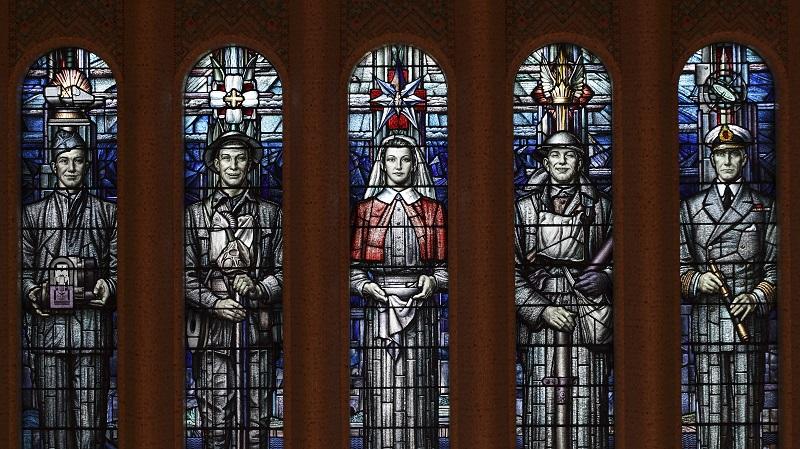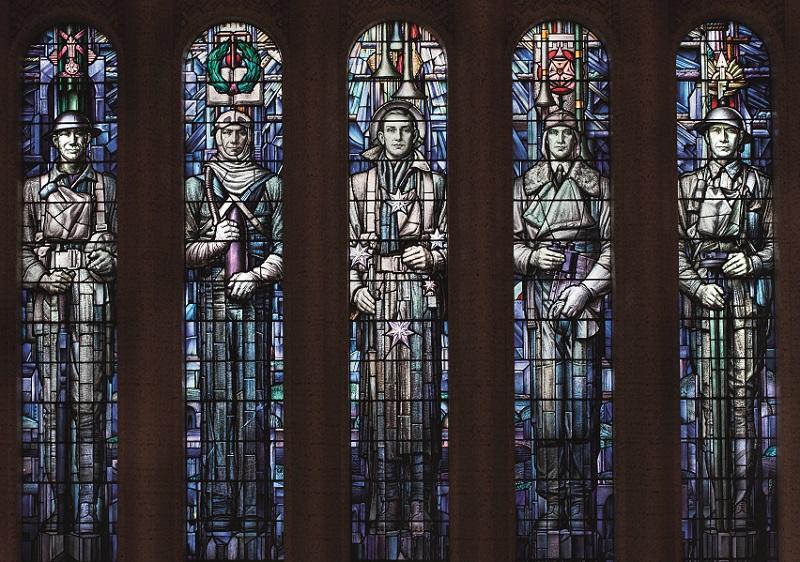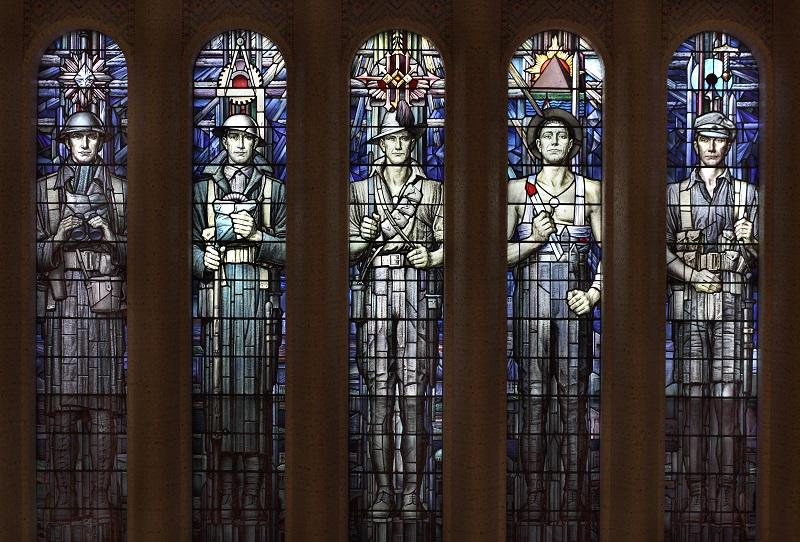Hall of Memory - Stained-Glass Windows
There are stained-glass windows on three sides of the Hall of Memory, each window divided into five panels. Each of the fifteen panels features a figure in the uniform and equipment of the First World War, and typifies one of the quintessential qualities displayed by Australians in war.
It was Waller who suggested that each window be divided into five tall panels. His aim was “to produce through repetition, and a broad monotone of blue and grey, a serenity of effect with a dim cathedral light. At the bottom of each window are fragmentary remains from destruction and war.”
The figures in the south window represent personal qualities.
| Resource | An aircraftman, signified by a clamp vice and electric arc. In the panel above him are the flame of invention, and a sword severing the Gordian Knot, recalling the deed of Alexander the Great in Greek legend. These images represent the Australian quality of finding creative and bold solutions to difficult problems. |
| Candour | A signaller and an open flower. In the panel above him, an owl’s head fountain and three arrowheads pointing upward refer to the frank way Australian servicemen and women express themselves. |
| Devotion | A nurse, with the Red Cross as the symbol of charity. In the panel above her are a shield bearing the badges of the six states in the Australian coat of arms, and a pelican feeding her young from her bleeding breast, the ancient symbol of devotion. |
| Curiosity | An infantryman wearing a trench mortar battery uniform. The winged crown suggests the reward of knowledge from enquiry, symbolised in the window above by an eye in the Egyptian style from which stream rays of light. |
| Independence | A naval captain with a gyroscope, a device that maintains its orientation even when tilted, symbolising stability and direction. The three red lamps in a vertical line signal that a vessel is maintaining its course, expressing national steadfastness in the face of war. |
The figures of the west window represent social qualities.
| Comradeship | A Lewis gunner. The panpipes clustered and bound together in unity are a symbol of fellowship and good cheer. |
| Ancestry | A naval gunner. The symbols are associated with European traditions: a wreath and open book represent reverence for knowledge, cricket stumps and ball stand for recreation, and the church spire for religion. The flag signals “engage the enemy at close quarters”. |
| Patriotism | An infantryman, with the stars of the Southern Cross superimposed. Loyalty to the Commonwealth is represented by symbols of the British monarchy in the window above, which features a lion, orb and crown. |
| Chivalry | An airman and medieval symbols: the rose of chivalry, visored helmet, spears, tilting spurs, and a lance bearing St George’s Cross. They link the chivalric code of medieval knights to the code of Australian servicemen and women. |
| Loyalty | An artilleryman holding a gunnery director that helps to aim guns. Above him is the badge of the Australian Imperial Force, and a column with flames representing loyalty to a cause or ideal. |
The figures of the east window represent the fighting qualities of youth and enterprise.
| Coolness | An infantry officer in a trench coat. The prism and the shield of the Greek goddess of war, Athena, represent coolness and confidence in the face of adversity. |
| Control | An infantryman in a greatcoat. The measuring devices (ratchet wheel, callipers, right-angle ruler) represent ways to control one’s environment and oneself. The shepherd’s crook is a biblical reference to the Good Shepherd, and the crossed sword and baton of high-ranking officers suggest a military equivalent. |
| Audacity | A light horseman. The qualities of boldness and daring are symbolised by an arrangement of arrows and wings; above him are an eagle alighting and arrowheads flying upwards. |
| Endurance | A wounded soldier holding a broken sword point. The symbols of the pyramid and a column carved in rock denote stability and physical endurance. |
| Decision | An Australian soldier in the uniform worn at Anzac Cove. A target, bared sword and emblematic spear all denote directness toward a specific objective. |


